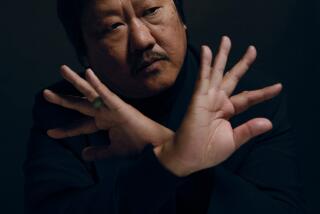Actor Relives His Descent in ‘Quitting’
- Share via
As Zhang Yang’s “Quitting” begins, a young man with long hair parted in the middle looks straight into the camera over a soundtrack of rumors concerning what happened to the popular star Jia Hongsheng, who seemed to have disappeared in the mid-’90s.
There is a flood of clips, mainly from action films, of Jia, who proves to be the young man looking out from the screen.
In the late ‘80s Jia became known as the “thug idol” of the Chinese screen for his appearances in a series of B-movies.
In frustration, he turned to the stage in 1992 to star in an acclaimed stage version of “The Kiss of the Spider Woman,” which Zhang Yang directed the same year he graduated from Jia’s alma mater, Beijing’s Central Theater Academy.
The young actor found himself in demand for important movies but became increasingly caught up in drugs. (Recently, however, he starred in the striking noir film “Suzhou River.”)
The intense Jia commenced his four-year downward spiral during rehearsals for “Spider Woman.” Ah Bin, set designer for the play--and art director for “Quitting”--introduced Jia to marijuana as a way to relax.
Jia reacted to the drug strongly but, instead of turning away from drugs, began smoking heroin.
After watching himself give what he regarded as a terrible performance in a TV period melodrama, Jia quit acting and retreated to his spacious but derelict Beijing apartment, shared with his despairing sister Wang Tong, who supported them.
In the harrowing saga of Jia’s fall and struggle to recover, he and everyone else in his life, amazingly, play themselves, reliving seven years in their lives.
Zhang spent several years interviewing all those who appear on the screen and developing a script (with Huo Xin).
In Jia Hongsheng, Zhang sees a talented and essentially serious young man reacting to the seismic changes in Chinese society in the wake of events at Tiananmen Square and the advent of a free market society. “Quitting” gets underway with the arrival in Beijing of his father and mother, Jia Fengsen and Chai Xiurong, veteran members of an acting troupe in a small town in northeastern China. They know of their moody and hostile son’s substance abuse problems and have decided to tackle them head-on.
The father begins to think he’s making some progress in communicating with his son, only to be faced with the full extent of the problem. (Curiously, the film doesn’t indicate how Jia obtained hard drugs and how he could afford them.)
Zhang pulls back the camera a couple of times to reveal that the Beijing apartment is actually a set on a stage in a theater. Far from making the subject seem artificial, it sets off the sense of reality with which the people are playing themselves.
Zhang could not have pulled off this film were Jia not prepared both to look inward and to open himself up freely. It helps that the three central figures, Jia and his parents, are professionals. The image of the apartment set inhabited by the family becomes a point of reference for Zhang’s moving back and forth over seven years.
“Quitting” is Zhang’s third feature and, like “Shower,” his second, it explores the challenges of a loving parent-child relationship, although structurally and thematically “Quitting” is more daring and complex. At 112 minutes, it might be 15 minutes too long, but this is not enough to detract from its impact as a probing and universal contemporary drama.
MPPA rating: R, for strong drug use. Times guidelines: also strong drinking, mature themes.
‘Quitting’
Jia Hongsheng...As himself
Jia Fengsen...As himself
Chai Xiurong...As herself
Wang Tong...As herself
A Sony Pictures Classics release of an Imar Film Co. production in association with the Xian Film Studio. Director Zhang Yang. Producer Peer Loehr. Executive producer Sam Duann. Screenplay by Zhang Yang and Huo Xin. Cinematographers Wang Yu and Chenq Shouqi. Editor Yang Hong Yu. Music Zhang Yadong. Art director An Bin. Running time: 1 hour, 52 minutes. In Mandarin, with English subtitles.
Exclusively at the Music Hall, 9036 Wilshire Blvd., Beverly Hills, (310) 274-6869; the Playhouse 7, 673 E. Colorado Blvd., Pasadena, (626) 844-6500; and the University 6, Campus Drive, opposite UCI, Irvine, (800) 555-TELL.
More to Read
The biggest entertainment stories
Get our big stories about Hollywood, film, television, music, arts, culture and more right in your inbox as soon as they publish.
You may occasionally receive promotional content from the Los Angeles Times.










